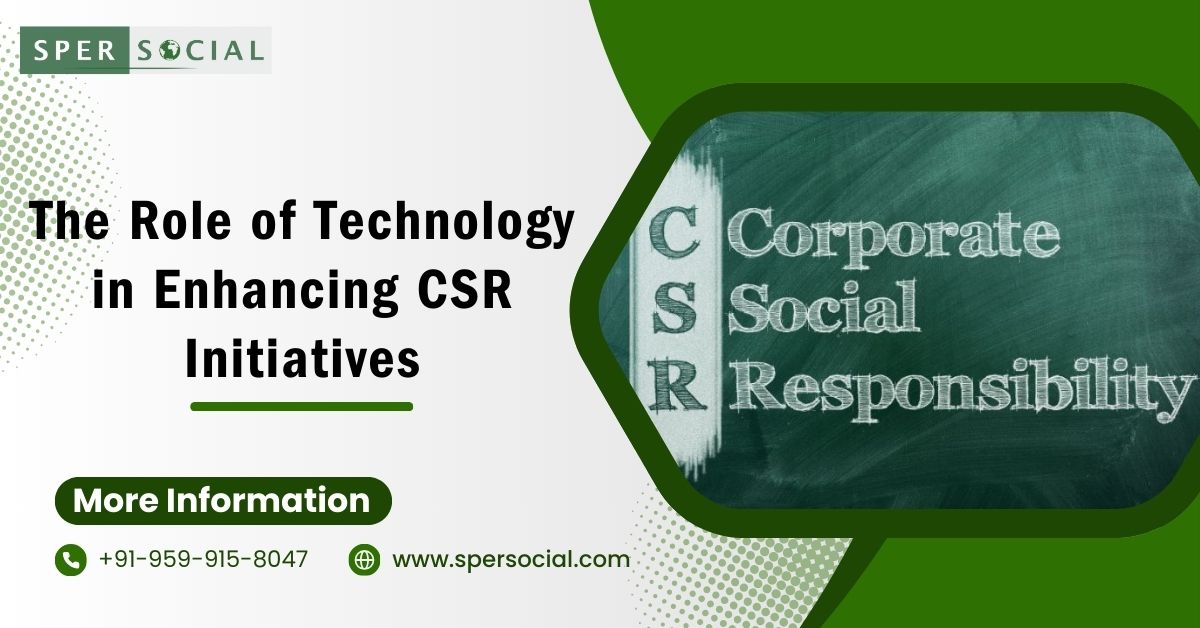
Introduction
Corporate Social Responsibility (CSR) has become an integral part of how businesses operate, allowing companies to give back to society while enhancing their reputation. But as societal expectations increase, so does the need for more effective and transparent CSR efforts. Enter technology—modern tools like Artificial Intelligence (AI), blockchain, and the Internet of Things (IoT) are revolutionizing the way companies manage and implement CSR initiatives. In this article, we’ll explore how these emerging technologies are reshaping CSR and making it more impactful and accountable..
The Rise of Technology in CSR:
The digital age has brought a significant transformation in how businesses approach CSR. Emerging technologies offer the opportunity to optimize CSR efforts, making them more precise, transparent, and impactful. Technology provides a mechanism for companies to not only track their CSR performance but also to engage with communities and stakeholders more effectively.
Artificial Intelligence (AI) in CSR:
AI is revolutionizing CSR by enabling data-driven decision-making. Here’s how AI is making a difference:
Analyzing CSR Data: AI can analyze large volumes of data from diverse sources, helping companies identify societal needs and gaps. This allows organizations to tailor their CSR efforts to specific issues with precision.
Predictive Analytics: AI’s predictive capabilities can forecast social and environmental challenges, helping businesses plan ahead and allocate resources more effectively.
Personalized CSR Outreach: AI can tailor CSR communication to resonate more with different stakeholder groups, increasing engagement and ensuring the company’s message aligns with its audience.
Blockchain for Transparency in CSR Initiatives:
Blockchain’s role in CSR is all about transparency. Companies often face skepticism about how they spend CSR funds or manage projects. Blockchain solves this by providing an immutable ledger of transactions and activities, allowing stakeholders to trace each dollar spent on CSR projects.
Enhanced Transparency: Blockchain ensures that all CSR actions are recorded in real-time, offering stakeholders a clear view of how the company is contributing to its social and environmental promises.
Real-Time Auditing: With blockchain, CSR projects can be audited instantly, making it easier for companies to verify their contributions and avoid misreporting.
Internet of Things (IoT) and CSR:
The IoT, with its network of connected devices, is proving invaluable for CSR, particularly in monitoring environmental impact. IoT devices can track emissions, energy consumption, and other environmental factors in real time.
Monitoring Environmental Impact: Sensors installed in factories, offices, and vehicles can provide real-time data on a company’s carbon footprint. This data can then be used to minimize environmental harm.
Optimizing Resource Usage: IoT-enabled devices can automate processes and optimize resource usage, reducing waste and energy consumption.
Sustainable Supply Chain Management: Companies can use IoT to monitor the sustainability of their supply chains, ensuring that resources are ethically sourced.
Digital Platforms for Stakeholder Engagement:
Digital platforms enable companies to engage stakeholders in a more dynamic and interactive way. Stakeholders can provide feedback, track CSR progress, and even participate in CSR decision-making processes.
Monitoring and Feedback: Digital tools allow stakeholders to monitor CSR initiatives in real-time and provide feedback on the company’s social impact efforts.
Collaborative Platforms: These platforms can also serve as spaces for collaboration between companies, governments, and non-profits to achieve common social goals.
Improving CSR Accountability with Technology:
Technology is helping companies improve their CSR accountability by making it easier to track and report CSR activities. Tools like blockchain, AI, and IoT ensure that CSR efforts are measurable and verifiable.
Tech-Driven Accountability: Companies are now held accountable not just by internal audits but by real-time data that anyone can access and review.
Transparent Reporting: Transparent and traceable reporting systems are integral to maintaining trust in CSR initiatives.
Case Studies: Successful Technology-Driven CSR Programs:
Many companies have already embraced technology to improve their CSR efforts. For instance, Microsoft uses AI to enhance environmental sustainability, while IBM leverages blockchain to promote ethical sourcing in supply chains.
The Future of CSR and Technology:
As technology continues to evolve, its role in CSR will only grow. We can expect to see more advancements in AI, blockchain, IoT, and big data, driving even more effective and transparent CSR programs.
Upcoming Trends: From AI-driven sustainability to IoT-based environmental monitoring, the future of CSR lies in tech innovation.
Preparing for the Future: Companies need to stay agile, embracing these technological advancements to remain relevant and impactful in their CSR initiatives.
Conclusion
Technology is revolutionizing CSR, making it more effective, transparent, and accountable. By integrating AI, blockchain, IoT, and other digital tools, companies can better meet their CSR goals and make a more meaningful impact on society.
SPER SOCIAL
SPER SOCIAL, your premier destination for innovative solutions in Corporate Social Responsibility (CSR) and Environmental, Social, and Governance (ESG) initiatives. At SPER SOCIAL, we pride ourselves on our expertise, tailored solutions, global perspective, and commitment to long-term impact. With a passion for sustainability and a dedication to making a difference, we empower organizations to navigate the complexities of CSR and ESG with confidence and purpose.
#303-304, Tower B, Noida One, Sector 62, Noida, India
contact@spersocial.com
+1-347-460-2899
+91-959-915-8047
